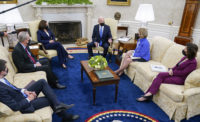As the Senate works its way through a list of proposed amendments to its massive infrastructure package, lawmakers have approved a proposal to broaden the reach of federal surety-bond protection on construction projects to include projects assisted by the Transportation Infrastructure Finance and Innovation, or TIFIA, Act
The Senate also voted down some amendments, including a proposal that would have prevented the White House from cancelling contracts to build segments of the barrier on the U.S. border with Mexico.
The underlying legislation is the top legislative priority for the engineering and construction industries, and includes $550 billion in funding over current levels for a wide range of types of infrastructure, including highways, transit, rail, water, the electric grid and broadband. It also would provide more certainty over the flow of federal funds going forward, by reauthorizing federal highway and transit programs for five years. Those programs’ authorizations are scheduled to lapse on Sept. 30.
The surety amendment, sponsored by Sen. Chris Van Hollen (D-Md.) would extend Miller Act bonding protection, which now applies to direct federal construction contracts, to projects financed by TIFIA. That could cover private funding in public-private partnerships, or P3s, which sometimes are features of TIFIA projects.
The Senate approved the amendment, which had bipartisan backing and strong surety industry support, on Aug. 4, by a 97-0 vote.
Van Hollen said in a statement, “Contractor defaults on infrastructure projects can cause costly delays, wasting taxpayer dollars and leaving residents, local stakeholders, and project workers in the lurch."
He added, "As we work to make historic investments in our nation’s transportation network, we must ensure that projects are financed securely."
Under the amendment, the surety bond requirement would apply to any projects for which a TIFIA loan is approved after the date the underlying bill, the Infrastructure Investment and Jobs Act, becomes law.
The surety provision has House support, too. A similar amendment was included in the House-passed infrastructure bill, the INVEST in America Act.
Surety Industry Support
Mark McCallum, the National Association of Surety Bond Producers' president and chief executive officer, said in an interview that at present, “There’s no guarantee that [TIFIA] infrastructure projects—particularly if they have some element of a private participation—would necessarily have bond protections in place.”
The amendment, he says, will ensure that TIFIA-assisted projects “will at least have performance and payment protection."
Under the 1935 Miller Act, federal surety bond requirements apply to direct federal construction contracts valued at more than $150,000.
States have their own similar regulations in place—sometimes referred to as “little Miller Acts,”—which provide bond protection for state-funded construction projects. But they have varying protection levels.
Lee Covington, Surety & Fidelity Association of America president and CEO, said in an interview that the amendment is important. "We know construction is a risky business," Covington says.
With the prospect of increased construction funding under the pending legislation, he says, "We think it’s very very important that all this new infrastructure investment be properly secured by [surety] bonds."
TIFIA and WIFIA
TIFIA, authorized in 1998, provides low-interest federal loans for certain infrastructure projects. States and other recipients of TIFIA loans combine the loan proceeds with other revenue sources, such as state grants and private funding.
Since TIFIA’s launch, the U.S. Dept. of Transportation has closed $34.5 billion in financing. The loans support a total of $120 billion in investment, according to DOT.
Down the road, surety industry officials are looking to see federal surety requirements expand further to the other federal infrastructure loan program—the Water Infrastructure Finance and Innovation Act, or WIFIA.
Covington says, “We’ll take a look at WIFIA and see whether that needs some clarification as well.
WIFIA was authorized in 2014 for the Environmental Protection Agency and the Army Corps of Engineers.
WIFIA got off to a slow start, due partly to a lack of appropriations to support the loans. It didn't approve its first WIFIA loan until April 2018.
Since then, however, EPA has moved aggressively. Through mid-June, the agency had approved 52 WIFIA loans, totaling $10.5 billion, which help finance projects whose combined cost is more than $23 billion.
Corps Launching Its WIFIA, Too
For its part, the Army Corps has established the Corps Water Infrastructure program, or CWIF. But it has been running behind EPA's pace.
In December 2020, however, the Corps got its first appropriations. It says in its CWIF web page that with appropriations in hand, "we will work expeditiously to issue loans to qualified non-federal borrowers."
The Corps says program regulations and fee rules are expected to be published in the Federal Register later this year.
Border Wall Amendment Defeated
The border wall amendment, sponsored by Sen. Ron Johnson (R-Wis.), was defeated on Aug. 4 on a 48 to 49 vote—approval would have required 60 votes.
Johnson said in a statement that his proposal is “very common sense." He added, "It says 'Please, let’s recognize fences work….let’s not waste the taxpayers' money.'" It would have affected about 285 miles of unfinished border wall.
In all Senate Majority Leader Chuck Schumer (D-N.Y.) said, as of Aug. 4, the Senate had considered 22 amendments to the infrastructure measure.
Of those,12 were approved and 10 were not. He also said that 13 of the 22 amendments were sponsored by Republicans.






Post a comment to this article
Report Abusive Comment